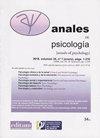新冠肺炎对墨西哥城住院患者样本的心理健康影响
IF 1.3
4区 心理学
Q3 PSYCHOLOGY
引用次数: 0
摘要
大流行的后果之一是焦虑、抑郁和压力等心理变化的发生率增加。在此,我们旨在通过一项横向和观察性研究来确定COVID-19住院患者中压力、焦虑和抑郁的患病率,以及它们与COVID-19住院患者亲属所受情绪影响的可能关联。45例平均年龄为54.4±9.6岁的新冠肺炎住院患者和55例平均年龄为43.2±11.8岁的亲属接受了问卷调查和DASS-21问卷调查。我们的研究结果显示,通过DASS-21量表评估,抑郁、焦虑和压力的患病率很高。我们还确定了与情绪健康相关的危险因素,如年龄(< 50岁:抑郁OR = 2.99 [1.31, 6.80], p < 0.05,焦虑OR = 2.83 [1.15, 6.93], p < 0.05)、性别(女性:焦虑OR = 4.13 [1.57, 10.89], p < 0.05,压力OR = 5.38 [2.27, 12.8], p < 0.05)、研究群体(亲属:抑郁OR = 3.83 [1.63, 8.96];p < 0.05,焦虑OR = 3.60 [1.46, 8.88];p < 0.05,应激OR = 3.30 [1.41, 7.70];P < 0.05)。此外,女性和低社会经济地位的患者(β = 3.23;1.96)和亲属(β = 1.86;2.31)与焦虑(p < 0.05)和压力(p < 0.05)得分相关。我们的结论是,我们的COVID-19患者样本中精神改变的患病率很高,年龄、性别和社会经济地位改变了这些疾病的严重程度。大流行性疾病的连续报告是《精神疾病交替流行报告》,《疾病交替流行报告》,《疾病交替流行报告》,《疾病交替流行报告》,《疾病交替流行报告》,《疾病交替流行报告》。研究人员通过横向观察研究了evaluó与病死率相关的病例,并分析了depresión与病死率相关的住院患者与病死率相关的病例así与病死率相关的病例可能的情况asociación与病死率相关的病例对病死率相关的情绪反应的影响。新冠肺炎住院患者感染率为54.4±9.6 años新冠肺炎住院患者感染率为43.2±11.8 años受访患者感染率为batería感染前患者感染率为das -21。Nuestros的结果揭示了unaltaprevalencia de depresión,并由DASS-21的estracei识别。研究结果表明,研究对象的情绪障碍与研究对象的情绪障碍(< 50 años: depresión RM = 2.99 [1.31, 6.80] p < 0.05)、研究对象的情绪障碍(< 50 años: depresión RM = 2.99 [1.31, 6.80] p < 0.05)、研究对象的情绪障碍(研究对象:研究对象RM = 4.13 [1.57, 10.89], p < 0.05)、研究对象的情绪障碍(研究对象:研究对象RM = 5.38 [2.27, 12.8], p < 0.05)和研究对象的情绪障碍(研究对象:depresión RM = 3.83 [1.63, 8.96];p < 0.05,方差RM = 3.60 [1.46, 8.88];p < 0.05 y estrimass RM = 3.30 [1.41, 7.70];P < 0.05)。Además, el gsamenero femenino y el nivel socioeconómico bajo de los pacientes (β = 3.23;β = 1.86;2.31)与对照组(p < 0.05)相比,对照组(p < 0.05)与对照组(p < 0.05)存在显著性差异。结论:新型冠状病毒肺炎(COVID-19)患者与其他疾病的相关性研究:与其他疾病因素的相关性研究sociodemográficos与其他疾病的相关性研究:与其他疾病的相关性研究。本文章由计算机程序翻译,如有差异,请以英文原文为准。
Mental health impact by COVID-19 in hospitalized patients sample in Mexico City
One of the consequences of pandemic is the increase in the prevalence of mental alterations such as anxiety, depression and stress. Since here, we aimed to determinate through a transversal and observational study prevalence of stress, anxiety and depression within hospitalized patients by COVID-19 as well as their likely association with the emotional impact received by relatives with hospitalized patients by COVID-19. Forty-five COVID-19 hospitalized patients with mean age of 54.4 ± 9.6 years and fifty-five relatives with mean age of 43.2 ± 11.8 years answered a questions battery and DASS-21 survey. Our results revealed high prevalence of depression, anxiety and stress assessed by DASS-21 subscales. We also identified risk factors associated with the emotional health such as age (< 50 years: depression OR = 2.99 [1.31, 6.80], p < .05 and anxiety OR = 2.83 [1.15, 6.93], p < .05), by gender (female: anxiety OR = 4.13 [1.57, 10.89], p < .05 and stress OR = 5.38 [2.27, 12.8], p < .05), by group of study (relatives: depression OR = 3.83 [1.63, 8.96]; p < .05, anxiety OR = 3.60 [1.46, 8.88]; p < .05 and stress OR = 3.30 [1.41, 7.70]; p < .05). Additionally, female gender and low socioeconomic status in patients (β = 3.23; 1.96) and relatives (β = 1.86; 2.31) were associated with higher scores in anxiety (p < .05) and stress (p < .05). We concluded that our sample of COVID-19 patients maintain a high prevalence of mental alterations and age, gender and socioeconomic status modify the magnitude of these disorders.
Una de las consecuencias de la pandemia es el aumento de la prevalencia de alteraciones mentales como la ansiedad, la depresión y el estrés. En este estudio transversal y observacional se evaluó la prevalencia de estrés, ansiedad y depresión en pacientes hospitalizados por COVID-19 así como la probable asociación con el impacto emocional recibido por familiares de pacientes hospitalizados por COVID-19. Cuarenta y cinco pacientes hospitalizados por COVID-19 con una edad promedio de 54.4 ± 9.6 años y cincuenta y cinco familiares de pacientes hospitalizados con una edad promedio de 43.2 ± 11.8 años respondieron una batería de preguntas y la encuesta DASS-21. Nuestros resultados revelaron una alta prevalencia de depresión, ansiedad y estrés identificados por DASS-21. En este estudio identificamos factores de riesgo asociados a la salud emocional como la edad (< 50 años: depresión RM = 2.99 [1.31, 6.80] p < .05 y ansiedad RM = 2.83 [1.15, 6.93], p < .05), el género (mujeres: ansiedad RM = 4.13 [1.57, 10.89], p < .05 y estrés RM = 5.38 [2.27, 12.8], p < .05) y el grupo de estudio (familiares: depresión RM = 3.83 [1.63, 8.96]; p < .05 , ansiedad RM = 3.60 [1.46, 8.88]; p < .05 y estrés RM = 3.30 [1.41, 7.70]; p < .05). Además, el género femenino y el nivel socioeconómico bajo de los pacientes (β = 3.23; 1.96) y familiares (β = 1.86; 2.31) se asociaron con puntuaciones más altas en ansiedad (p < .05) y estrés (p < .05). Concluimos que la muestra de pacientes con COVID-19 mantiene una alta prevalencia de alteraciones mentales y que algunos factores sociodemográficos se asocian con la magnitud de estos trastornos.
求助全文
通过发布文献求助,成功后即可免费获取论文全文。
去求助
来源期刊

Anales De Psicologia
医学-心理学
CiteScore
3.30
自引率
5.90%
发文量
57
审稿时长
4-8 weeks
期刊介绍:
Anales de Psicologia / Annals of Psychology is a multidisciplinary journal of the various thematic areas of scientific psychology. It publishes original research articles and theoretical review in any of its basic, applied and methodological areas included within psychology.
Publishing, financing, marketing and distribution corresponds Editum: Editions of the University of Murcia (Spain). The organizational guidelines and editorial policies come from the Editorial Team (elected for four years by the Areas and / or Departments of Psychology at the University of Murcia) and the Editorial Board, composed of scholars and experts from different universities and institutions national and international. It is published in print (ISSN: 0212-9728) since 1984 and in Internet publishing (web) (ISSN: 1695-2294) since 2000. Available online full text in pdf from the vol. 1 1984.
Anales de Psicologia / Annals of Psychology maintains a system of exchange with other journals and publications of psychology in the world. Through an free exchange agreement with their respective publishers or entities responsible for editing, these journals and publications are received at the University of Murcia (Biblioteca "Luis Vives", near the Faculty of Psychology) and in return, our journal is sent to libraries and educational and research institutions such centers responsible for editing.
 求助内容:
求助内容: 应助结果提醒方式:
应助结果提醒方式:


